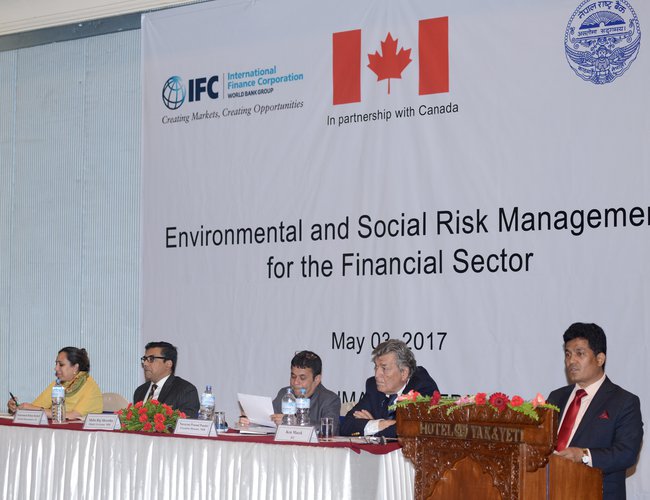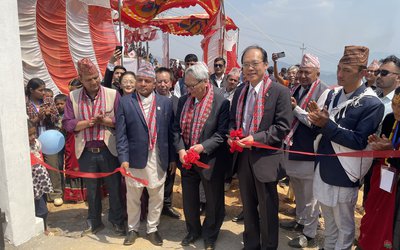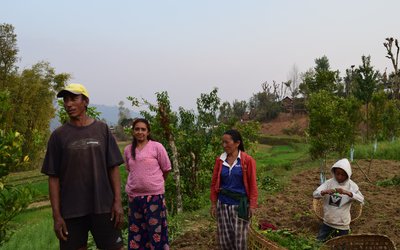
IFC, a member of the World Bank Group, is partnering with Nepal Rastra Bank (NRB), the central monetary authority of Nepal, to help the bank adopt improved environmental and social risk management practices to strengthen their portfolio performance, generate business opportunities and boost competitiveness in the region.
Improved risk management practices will help minimize potential risks for financial institutions and will create increased access to financing for businesses with strong environment and social performance.
As part of this program, IFC will assist NRB in adopting a robust Environmental and Social Risk Management Guideline and promoting its adoption by financial institutions in Nepal. At a workshop held today in Kathmandu, senior representatives from government, the financial sector, and international organizations came together to share information, propose ideas, and build a consensus on how Nepal’s financial sector can better identify, manage and mitigate risks.
“We want to help financial institutions effectively manage environmental and social risks associated with the projects they finance and increase support to businesses that are greener, climate friendly, and socially inclusive,” said NRB Deputy Governor Mr Shiba Raj Shrestha. “It is vital that financial institutions come together to establish an effective and robust environmental and social management system.”
As a member of IFC’s Sustainable Banking Network (SBN), NRB also benefits from the experience and knowledge of other members. The SBN works with associations and regulators to level the playing field for banks and encourage green investment. To date, 15 SBN member countries have launched sustainable finance polices, guidelines and roadmaps.
“Financial institutions can strengthen their portfolio by better assessing risks during loan or investment appraisal, when considering projects,” said Rehan Rashid, Resident Representative, IFC Nepal. “IFC has been a long-term partner for Nepal’s financial sector. We help strengthen risk management, enhance competitiveness, and support cross-border expansion by helping improve best practices in environmental and social standards including Equator Principles and IFC’s Performance Standards.”
Financial institutions have emerged as ideally placed to help the private sector adapt to new economic realities imposed by climate change impact. In Nepal, the financial sector plays a leading role in sustainable economic growth through lending and investment activities.
IFC is working with banking regulators and financial institutions across Bangladesh, India and Sri Lanka as part of the Sustainable Banking Network – of which NRB is an active member from South Asia.
Nepal is a priority country for IFC. IFC is sharpening its focus in Nepal to improving access to energy through sustainable hydropower development; promoting financial inclusion; enabling building tourism infrastructure and supporting job creation through investments in manufacturing, agri-business and services industries. As of June 30, 2016, IFC’s committed portfolio is over $50 million. IFC uses a combination of investments and advisory services to support private sector development in Nepal to ensure growth is inclusive and balanced.
IFC, a member of the World Bank Group, is the largest global development institution focused on the private sector in emerging markets. Working with 2,000 businesses worldwide, we use our six decades of experience to create opportunity where it’s needed most. In FY16, our long-term investments in developing countries rose to nearly $19 billion, leveraging our capital, expertise and influence to help the private sector end extreme poverty and boost shared prosperity. For more information, visit www.ifc.org.
About IFC-supported Sustainable Banking Network (SBN)
The Sustainable Banking Network (SBN) is a knowledge and capacity-building platform of financial regulators, banking associations, and environmental regulators from emerging markets interested in developing sustainable finance frameworks based on national context and priorities, as well as international good practices. IFC acts as the Secretariat of the Network, playing the role of facilitator and Technical Adviser to SBN. SBN membership now consists of 31 member countries, which represent over 85 percent of the banking assets across emerging markets. CBSL joined SBN in 2016. For more information on the Sustainable Banking Network, visit www.ifc.org/sbn.
- TANAHU HYDROPOWER PROEJCT: A Significant Achievement
- Apr 15, 2024
- AMBASSADOR HANAN GODAR: Sharing Pain With A Nepali Family
- Mar 30, 2024
- VISIT OF KfW AND EIB TO NEPAL : Mission Matters
- Mar 25, 2024
- NEPAL BRITAIN SOCIETY: Pratima Pande's Leadership
- Mar 24, 2024
- NEPAL ARMY DAY: Time To Recall Glory
- Mar 15, 2024
















